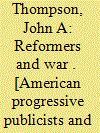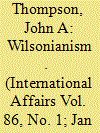| Srl | Item |
| 1 |
ID:
068856


|
|
|
| 2 |
ID:
073378


|
|
|
| 3 |
ID:
034798


|
|
|
|
|
| Publication |
Cambridge, Cambridge University Press, 1987.
|
| Description |
xi, 300p.hbk
|
| Standard Number |
052125289X
|
|
|
|
|
|
|
|
|
|
|
|
Copies: C:1/I:0,R:0,Q:0
Circulation
| Accession# | Call# | Current Location | Status | Policy | Location |
| 028716 | 973.91/THO 028716 | Main | On Shelf | General | |
|
|
|
|
| 4 |
ID:
095110


|
|
|
|
|
| Publication |
2010.
|
| Summary/Abstract |
Americans have generally seen the principles and objectives proclaimed by President Woodrow Wilson during the First World War as having continued relevance for United States foreign policy. However, they have often differed over their application to specific situations, particularly because there is likely to be a tension between a drive to establish democratic values across the globe and commitment to a universal system of collective security. Rather than seeking a pure, abstract definition of 'Wilsonianism', it is more illuminating to examine its origins and evolution in relation to the development of American foreign policy over the years. Tracing this historical process reveals that Wilson committed himself to a postwar league of nations during the period of American neutrality, but it was only as the United States became a belligerent that the spread of democratic government became a policy objective, and then only in a partial and qualified way. A similar pattern has been discernible in subsequent decades. It has been during conflicts, or the run-up to them, that the more ideological and revisionist aspects of Wilsonian principles have come to the fore, whereas it has been in the aftermath of conflicts that there has been the greatest interest in the potentialities of a universal collective security organization. There has also been a broad shift of emphasis over time. As confidence in America's power position has grown, the core of Wilson's legacy has more often come to be seen as the promotion of democracy rather than the strengthening of international institutions. The persistence of both themes may be seen as reflecting basic and enduring elements of the policy-making context-on the one hand, the interests of the United States as a status quo power, and on the other, the demands of domestic American opinion.
|
|
|
|
|
|
|
|
|
|
|
|
|
|
|
|